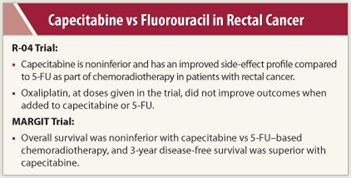Two separate trials presented during an oral session at the 2011 ASCO Annual Meeting suggest that capecitabine (Xeloda) can replace fluorouracil (5-FU) as part of chemoradiotherapy for rectal cancer. Patients randomly assigned to either treatment had comparable outcomes but with less toxicity from capecitabine in both phase III trials.
R-04 Trial
 In the National Surgical Adjuvant Breast and Bowel Project (NSABP) R-04 trial, capecitabine plus preoperative radiotherapy achieved similar outcomes compared with continuous venous infusion of 5-FU in patients with stage II or III rectal cancer.1 The study design incorporated a comparison of both drugs given concomitantly with oxaliplatin after the drug was approved in the United States. Adding oxaliplatin to either strategy did not improve outcomes but did increase toxicity, especially grade 3 or 4 diarrhea (41% with no oxaliplatin, 67% with oxaliplatin).
In the National Surgical Adjuvant Breast and Bowel Project (NSABP) R-04 trial, capecitabine plus preoperative radiotherapy achieved similar outcomes compared with continuous venous infusion of 5-FU in patients with stage II or III rectal cancer.1 The study design incorporated a comparison of both drugs given concomitantly with oxaliplatin after the drug was approved in the United States. Adding oxaliplatin to either strategy did not improve outcomes but did increase toxicity, especially grade 3 or 4 diarrhea (41% with no oxaliplatin, 67% with oxaliplatin).
“Administration of capecitabine with preoperative radiotherapy achieved similar rates to continuous infusion 5-FU for surgical downstaging, sphincter-saving surgery, and complete pathologic response,” said Mark S. Roh, MD, of MD Anderson Cancer Center Orlando in Orlando, Florida. No significant differences between the two arms were found for node positivity or for surgical complications.
At the Annual Meeting, Dr. Roh reported secondary outcomes in this trial, which was a collaboration among the NSABP, North Central Cancer Treatment Group (NCCTG), Eastern Cooperative Oncology Group (ECOG), Cancer and Leukemia Group B (CALGB), and Southwest Oncology Group (SWOG) with an NCI-designed protocol. The trial was designed as a noninferiority trial for capecitabine vs 5-FU for local-regional disease control and sphincter preservation, and to determine whether the addition of oxaliplatin to either drug added benefit.
The study randomly assigned 1,608 patients to one of four treatment groups: continuous venous infusion of 5-FU with or without oxaliplatin, or capecitabine with or without oxaliplatin. The study was designed to determine whether the addition of chemotherapy during radiation therapy will improve local-regional relapse rate, disease-free survival, and overall survival, and these results are expected in 2013.
MARGIT Trial
 Long-term results of the phase III MARGIT trial also showed noninferiority for capecitabine vs 5-FU as part of adjuvant or neoadjuvant chemoradiotherapy for locally advanced rectal cancer.2 The study randomly assigned 392 patients to either arm as adjuvant therapy (n = 231) or neoadjuvant therapy (n = 161) in addition to total mesorectal excision surgery. The side-effect profiles of the two drugs differed, with a greater incidence of hand-foot syndrome, proctitis, diarrhea, and fatigue in the capecitabine arm, and more alopecia and leukopenia in the 5-FU arm.
Long-term results of the phase III MARGIT trial also showed noninferiority for capecitabine vs 5-FU as part of adjuvant or neoadjuvant chemoradiotherapy for locally advanced rectal cancer.2 The study randomly assigned 392 patients to either arm as adjuvant therapy (n = 231) or neoadjuvant therapy (n = 161) in addition to total mesorectal excision surgery. The side-effect profiles of the two drugs differed, with a greater incidence of hand-foot syndrome, proctitis, diarrhea, and fatigue in the capecitabine arm, and more alopecia and leukopenia in the 5-FU arm.
“Capecitabine may replace 5-FU as perioperative treatment of locally advanced rectal cancer,” stated Ralf Hofheinz, MD, Interdisciplinary Tumour Center, Mannheim, Germany.
Neoadjuvant capecitabine improved downstaging and achieved a numerically higher rate of pathologic complete response compared with 5-FU. It appears that radiotherapy given concurrently with capecitabine significantly increased the rate of diarrhea compared with concurrent radiotherapy plus 5-FU (P = .07).
 At 52 months of follow-up, both arms had similar rates of local recurrence: 6.1% with capecitabine vs 7.2% with 5-FU, but capecitabine was superior regarding distant metastases, with 18.8% of patients vs 27.7% in the 5-FU group. For the study’s primary endpoint of overall survival, capecitabine was noninferior to 5-FU: the 5-year overall survival rate was 75.7% for capecitabine vs 66.6% for 5-FU (P = .0004). The 3-year disease-free survival rate was superior for capecitabine: 75.2% vs 66.6% with 5-FU (P = .034).
At 52 months of follow-up, both arms had similar rates of local recurrence: 6.1% with capecitabine vs 7.2% with 5-FU, but capecitabine was superior regarding distant metastases, with 18.8% of patients vs 27.7% in the 5-FU group. For the study’s primary endpoint of overall survival, capecitabine was noninferior to 5-FU: the 5-year overall survival rate was 75.7% for capecitabine vs 66.6% for 5-FU (P = .0004). The 3-year disease-free survival rate was superior for capecitabine: 75.2% vs 66.6% with 5-FU (P = .034).
The development of hand-foot syndrome was associated with superior 3-year disease-free and 5-year overall survival, Dr. Hofheinz said. Three-year disease-free survival was 83.2% for capecitabine-treated patients with hand-foot syndrome vs 71.4% for those patients treated with capecitabine who did not have hand-foot syndrome vs 66% for 5-FU patients (P = .031); 5-year overall survival rates were 91.4%, 68%, and 66.6%, respectively (P = .001). ■
Financial Disclosure: Dr. Roh reported no potential conflicts of interest. Dr. Hoffheinz has been a consultant for and has received honoraria from Amgen, Merck, KGaA, and Roche, and has conducted research for Roche.
References
1. Roh MS, Yothers GA, O’Connell MJ, et al: The impact of capecitabine and oxaliplatin in the preoperative multimodality treatment in patients with carcinoma of the rectum: NSABP R-04. 2011 ASCO Annual Meeting. Abstract 3503. Presented June 4, 2011.
2. Hofheinz R, Wenz F, Post S, et al: Capecitabine (Cape) versus 5-fluorouracil (5-FU)-based (neo)adjuvant chemoradiotherapy (CRT) for locally advanced rectal cancer (LARC): Long-term results of a randomized, phase III trial. 2011 ASCO Annual Meeting. Abstract 3504. Presented June 4, 2011.

